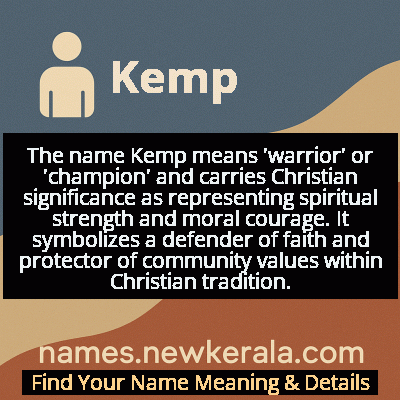Kemp Name Meaning & Details
Origin, Popularity, Numerology Analysis & Name Meaning of Kemp
Discover the origin, meaning, and cultural significance of the name KEMP. Delve into its historical roots and explore the lasting impact it has had on communities and traditions.
Name
Kemp
Gender
Male
Origin
Christian
Lucky Number
9
Meaning of the Name - Kemp
The name Kemp means 'warrior' or 'champion' and carries Christian significance as representing spiritual strength and moral courage. It symbolizes a defender of faith and protector of community values within Christian tradition.
Kemp - Complete Numerology Analysis
Your Numerology Number
Based on Pythagorean Numerology System
Ruling Planet
Mars
Positive Nature
Generous, passionate, energetic, and humanitarian.
Negative Traits
Impulsive, impatient, moody, and can be overly emotional.
Lucky Colours
Red, maroon, scarlet.
Lucky Days
Tuesday.
Lucky Stones
Red coral, garnet.
Harmony Numbers
1, 2, 3, 6.
Best Suited Professions
Military, sports, philanthropy, leadership roles.
What People Like About You
Courage, energy, leadership, generosity.
Famous People Named Kemp
Kemp P. Battle
Educator and University President
Served as president of the University of North Carolina and helped rebuild the institution after the Civil War
Kemp Nye
Military Officer and Test Pilot
Distinguished U.S. Air Force test pilot who set multiple aviation records and contributed to aircraft development
Kemp Malone
Scholar and Philologist
Renowned professor of English philology at Johns Hopkins University and editor of influential academic journals
Kemp Muhl
Musician and Artist
Lead vocalist of the band The Like and recognized for her contributions to contemporary indie music
Name Variations & International Equivalents
Click on blue names to explore their detailed meanings. Gray names with will be available soon.
Cultural & Historical Significance
Throughout English history, the name became associated with the concept of righteous strength and moral courage. During the Protestant Reformation, many Kemps were noted for their steadfast faith and willingness to defend religious principles. The name's transition from surname to given name in the 19th century reflected a romanticization of medieval chivalry and Christian warrior ideals, making it popular among families valuing tradition, strength, and religious conviction. This dual heritage as both physical protector and spiritual defender gives the name unique cultural resonance in Christian communities that value both strength of character and faith.
Extended Personality Analysis
Individuals named Kemp are typically characterized by strong leadership qualities, determination, and a protective nature that aligns with the name's warrior origins. They often exhibit natural confidence and a straightforward approach to challenges, preferring direct action over prolonged deliberation. This practical mindset is balanced by a deep sense of loyalty to their principles and loved ones, making them reliable partners and friends who will stand firm in times of adversity.
Beyond their assertive exterior, Kemps often possess strategic thinking abilities and a talent for organization that serves them well in both professional and personal endeavors. They tend to be competitive but fair, valuing honor and integrity in their interactions. While sometimes perceived as reserved or serious, those who know them well appreciate their steadfast nature and the quiet strength they bring to relationships and communities. Their combination of practical wisdom and moral conviction makes them natural problem-solvers who others frequently turn to for guidance, embodying the Christian ideal of strength tempered by principle and compassion.
Modern Usage & Popularity
In contemporary times, Kemp maintains a steady but uncommon presence as a given name, particularly in English-speaking countries with strong Christian traditions. It has experienced mild resurgence in recent decades as part of the trend toward strong, single-syllable masculine names with historical roots. While not ranking in the top 1000 names in most English-speaking countries, it retains appeal among families seeking names that convey strength and tradition without being overly common. The name is particularly popular in the American South and among families with British heritage, where its combination of warrior symbolism and Christian heritage resonates with values of faith, protection, and moral courage. Its usage reflects a preference for names with substantial historical background and meaningful symbolism rather than fleeting popularity.
Symbolic & Spiritual Meanings
Symbolically, Kemp represents the concept of righteous strength and spiritual warfare within Christian tradition. It embodies the idea of fighting for what is morally right rather than physical dominance alone. The name carries connotations of protection, honor, and steadfastness—qualities associated with both historical warriors and Christian virtues of defending faith and community. Metaphorically, it suggests someone who battles against adversity with principle and courage, serving as a guardian of values and a champion of justice. This symbolic meaning extends beyond physical combat to include intellectual, moral, and spiritual struggles, making it a name that represents comprehensive strength of character and the Christian ideal of being a 'soldier for Christ' in facing life's challenges.

